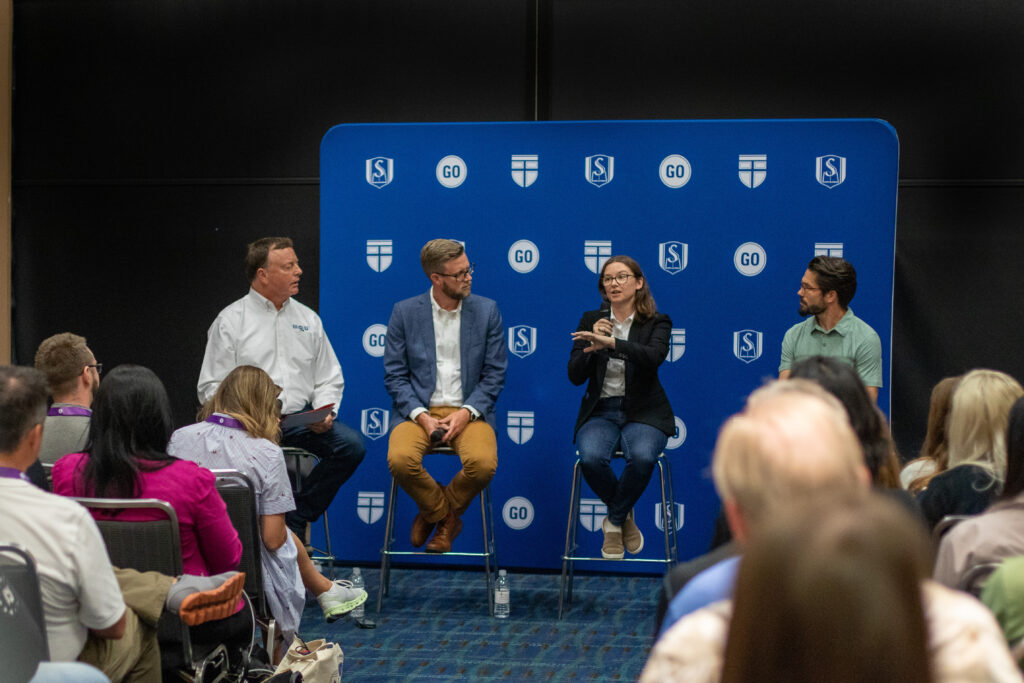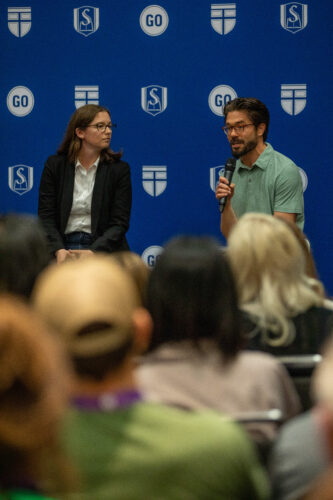Southeastern Hosts Panel on Ministry to Gen Z
Chad Burchett | June 12, 2023

On Monday, June 12, more than 150 pastors, church leaders, and guests joined Southeastern Seminary at the 2023 Southern Baptist Convention Annual Meeting for its panel discussion, Re-Forming Gen Z: Technology, Sexuality, and Human Formation. Hosted by Southeastern’s L. Russ Bush Center for Faith and Culture (CFC), Monday’s event addressed significant challenges facing Gen Z and strategies for serving them through faithful gospel ministry.
 Panelists included Jason Thacker, assistant professor of philosophy and ethics at Boyce College; Rachel Gilson, a member of the leadership team for theological development and culture at CRU; Jacob Shatzer, associate provost and dean of instruction at Union University; and Mark Liederbach, senior professor of ethics, theology, and culture, dean of students, and vice president for student services at Southeastern.
Panelists included Jason Thacker, assistant professor of philosophy and ethics at Boyce College; Rachel Gilson, a member of the leadership team for theological development and culture at CRU; Jacob Shatzer, associate provost and dean of instruction at Union University; and Mark Liederbach, senior professor of ethics, theology, and culture, dean of students, and vice president for student services at Southeastern.
Designed to help church and ministry leaders address some of the contemporary moment’s most pressing questions, the event offered attendees the opportunity to consider these issues from ethical, theological, and ministerial perspectives. Throughout the event, this holistic approach provided a unique space for attendees to seek robust gospel answers to sensitive and difficult questions.
“Gen Z faces unique challenges, especially regarding technology and sexuality,” CFC editor and content manager Nathaniel Williams commented about the event. “They face mounting pressure to conform to prevailing cultural winds. At the Re-Forming Gen Z event, we wanted attendees to hear from key leaders serving college students — so that together we might better understand the challenges Gen Z faces and be equipped to serve them well with the gospel.”
Addressing a full room, panelists answered a wide range of questions concerning prevalent issues related to sexuality that are facing Gen Z as well as proper gospel responses to these issues. Due to the complexity and divisiveness of the topic, panelists acknowledged the need to clarify terminology, including the distinctions between biblical marriage and same-sex unions.
“To say as Christians that we could have a marriage between a man and a man or a woman and a woman would actually completely undermine God’s main purpose for marriage, which is to communicate the beautiful picture of the gospel,” noted Gilson. “Marriage is a creation ordinance that God designed to be experienced between a man and a woman in faithfulness, representing his beautiful, faithful union with his bride.”
Marriage is a creation ordinance that God designed to be experienced between a man and a woman in faithfulness, representing his beautiful, faithful union with his bride.
Evangelizing and discipling Gen Z in the area of sexuality cannot be limited to the topic of same-sex attraction, however, as the panelists noted. What this generation needs is a biblically robust vision of what human sexuality means and entails according to God’s design. That is why Gilson reminded attendees that this biblical vision must also include singleness, Christian marriage, and the biblical pattern of repentance for sexual sin of any kind.
 Panelists urged attendees to disciple Gen Z on these issues by teaching them not only what God’s word says about sexuality but also what questions to ask and by providing space for their hard questions. In order for Gen Z to learn and embrace a biblical vision for sexuality, parents, ministry leaders, and churches need to take on the responsibility of modeling biblical attitudes, convictions, and practices on these issues. As Liederbach noted, “The way Christians live is the final apologetic.”
Panelists urged attendees to disciple Gen Z on these issues by teaching them not only what God’s word says about sexuality but also what questions to ask and by providing space for their hard questions. In order for Gen Z to learn and embrace a biblical vision for sexuality, parents, ministry leaders, and churches need to take on the responsibility of modeling biblical attitudes, convictions, and practices on these issues. As Liederbach noted, “The way Christians live is the final apologetic.”
According to Thacker, issues involving sexuality — like issues of technology and human formation — all fundamentally address the same ethical concern: what it means to be human.
“All these themes that we’re talking about today — from technology to Christian formation to sexuality — there is something anthropological about that,” remarked Thacker. “That’s why I am so thankful for Southeastern, this panel, and this center for focusing on anthropology.”
“The question of what it means to be human is at the center of almost every single ethical question we ask today,” continued Thacker. “The good news of the gospel, the good news of Christ, and the sufficiency of Scripture is that we have an answer to that question.”
Applying the gospel well to the complexity of life’s issues requires that Christians begin to recognize the ways technology and other influences are deeply shaping them, distorting their view of God, themselves, and the world around them.
“Technology is one of the primary disciplers of our people today,” Thacker argued, pointing to the ubiquity of technology in modern life.
Technology is one of the primary disciplers of our people today.
As panelists noted during the event, humans are being pressed by the fallen world to conform to its distorted image. That is why the Church must renew their minds and resist the pressures of being conformed to this world — especially with regard to the subtle yet pervasive effects of technology on the human mind.
Helping parents and ministry leaders respond biblically to technology, panelists offered advice on the proper use of technology and its place in the everyday rhythms of children and adults.

As Shatzer reminded attendees, a thoroughly biblical philosophy of ministry to Gen Z is to remember how far-reaching human sinfulness truly is and to respond with truth and love.
Continue to cultivate an attitude of love and listening and truth telling, recognizing that the problem is — as in any generation — that the way the Fall has fractured us is deeper than we ever suspect or notice,” counselled Shatzer. “When we have Gen Z brothers and sisters in our churches, we should be looking just as much for the unique ways that God has gifted them and the unique things that they see about God in his world.”
As Christians call Gen Z toward faithfulness to Christ — even in a cultural milieu where that is increasingly difficult and unpopular — the Church needs to remember that the transforming power of the gospel is truly good news.
“We need to have faith that the gospel is good news,” observed Gilson. “Jesus said the kingdom of heaven is like a treasure that’s hidden in the field, and when the man found it, he went and sold everything in his joy. He bought that field in his joy because the gospel is actually really good.”
We need to have faith that the gospel is good news.
Without a vision of the gospel as truly good and joyous, the Church will fail to encourage, confront, and equip Gen Z in ways that enable them to flourish in the local church and in God’s mission around the world.
As a part of the CFC’s three-year Being Human initiative, Monday’s event helped attendees capture this vision and learn biblical strategies for ongoing ministry to Gen Z. This panel and other recent CFC events and conferences have been made possible by the John Templeton Foundation, which awarded Southeastern with a $1.53 million grant to fund its Being Human initiative. To learn more about this initiative, check out this announcement from 2021.